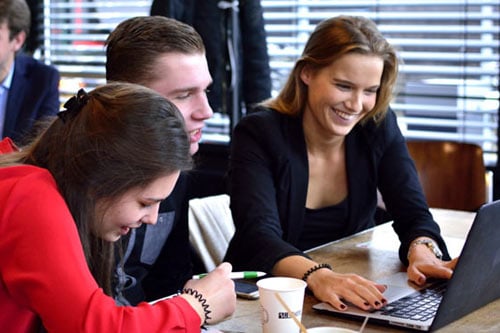"To be able to apply learning tools that draw on their [students'] own experiences is absolutely invaluable in helping them understand deeper theoretical concepts." Dr. Keith Halcro
Following on from May's webinar on experiential learning in relation to student engagement, we decided one was not enough and hosted a second one in July. This time with a slightly different focus.
Similar to May's, this webinar focussed on experiential learning approaches using business simulations but this time looking at their application at both and undergraduate and postgraduate levels.
Here we were joined by Dr. Keith Halcro from Glasgow Caledonian University and Alessandro Ferrazza from University of Sunderland in London, and, of course, the 'Master of Ceremony', Edumundo's own, Leon Lloyd.
We welcomed 43 attendees on the day, opening with a panel discussion covering:
- Experiential learning - flipping the classroom
- Engagement strategies
- Module assessment approaches
- Multi-disciplinary benefits beyond the module
- Promoting transferable skills - giving students real-world experience
Experiential Learning - Learning by Doing Instead Of Learning by Listening
The webinar opened with a discussion about experiential learning and how it differs from traditional, didactic/teacher-led instruction.
We heard from both Keith and Alex on their experiences as students and how the move away from solely didactic instruction to experiential learning has brought many benefits.
"My first degree was extremely didactic...there was no real interaction. The modern style of teaching is introducing flipped classrooms, much more problem-solving and peer-learning which is very much based on personal experience. Gamification helps develop this incredibly."
Alessandro
The panel discussed whether flipped learning is now embedded in HE-level teaching as a by-product of the Covid-19 pandemic. Leon pointed out:
"The role of the Lecturer is more like a facilitator rather than the disseminator of the information. It's giving students the opportunity to learn for themselves."
They also elaborated on the role of technology and how it has enhanced the learning process: complementing, not replacing, the teacher-led learning approach and overall learning experience.
"My message for people today is not that technology should be replacing you but how can it help you to engage students more, and give them a better experience. If the students have a better experience you will have a better experience."
Keith
Engagement Strategies in the Digital-Environment
Given the transition to online learning, an issue facing academic staff worldwide is how to engage students and maintain that engagement throughout their modules. Alessandro provided his take:
"Coming away from classroom teaching into the electronic environment, I noticed students sometimes lose a bit of focus. I wanted to ensure my students were always engaged in the simulation. To do that, I gave them an opportunity to earn extra points via a different task, such as creating a news article or an advert for a new product or a publicity stunt for their organisation."
But engagement isn't just about students. Isn't that right, Keith?
"It's not just about preparing your students but preparing your colleagues. I have a team of seven Tutors so it's about ensuring that the Tutors understand why we're using the simulation game and how we're using it...it allows them to feel they have more ownership of these activities."
Keith
Module Assessment - Similarities and Differences at Undergraduate and Postgraduate levels
Let's start with MBA assessment: Che cosa fai, Alessandro?
"The actual ranking has no relevance to the assessment criteria. The assessment is based on a reflective account of their participation to the module, leadership and management style and how they supported the rest of the team to achieve a good decision-making process and creating good opportunities for their organisation [in the simulation]."
As for Keith, he had a slightly different approach and weighting for his undergraduate students:
"We do award a certain amount of marks to the team's performance in the ranking. We felt that would help in keeping the teams engaged right through to the end...we use two assessments: a team assessment and an individual assessment both worth 50%. In the team assessment, 15% of that relates to the ranking performance."
One common denominator on both levels was a high degree of competitiveness throughout the rounds. Even to a degree where shady practices were taking places. Lawyers at the ready, we're talking about...
Student Bribery, Blackmail, and Collusion
It's worth noting at this point that we (Edumundo) are not advocating these practices as benefits of using a management simulation...but neither can we prevent them from happening (and, no, we've not been bribed/coerced in writing this).
Anyhow, here's Keith on the matter of shady simulation business:
"We hear humorous cases where students say they're trying to bribe and blackmail their friends. One student told me he used to ask his girlfriend what her team was doing to consistently beat his team in each round; he suspected she was giving him duff information. I suppose it relates to the practices that go on in the real-world. Sometimes our competitors are very honest and sometimes they feed us false information."
So, shady practices taking place at undergraduate level - that sentence strikes a note - but surely not at Postgraduate, MBA-level. Those students know better. Right, Alex?
"One of my teams were trying to bribe in all ways possible one of the members from another team because she was very good analytically at understanding figures. That didn't quite work out."
Obviously not! Well, Keith's point above clearly highlights that even in simulations, real-world practices do take a place, no matter how lawfully abiding they are or not.
Let's leave this sub-section on a positive, non-corruption-related, note:
"If there's a student who would normally sit in the background and watch the lectures, workshops, and seminars go by, they actually get drawn into this by their peers who try and motivate them to become more active in the simulation itself."
Alessandro
BreakOut Rooms Sessions - A forum for Demos and Discussions
The webinar culminated with a lively Breakout Room session involving a demo of the phone ventures simulation that both Keith and Alessandro use.
The session also provided a great opportunity for networking with fellow attendees, with plenty of LinkedIn profile links being shared.
Participants also discussed how they've used simulations in their teaching and provided advice to those who were considering them.
Get in touch if you're interested in finding out more about our simulations
Thank you to our wonderful guest speakers and participants on the day!
Did you miss the webinar? Don't worry...
View the recording or if you're in a hurry check out our one minute recap video below.
Looking for News on Our next webinar?
For updates on our future webinars, sign-up to our newsletter.


.png?length=300&name=unnamed%20(11).png)
.png?length=300&name=unnamed%20(7).png)
.png?length=300&name=unnamed%20(8).png)
.png?length=300&name=unnamed%20(6).png)

.png?length=300&name=unnamed%20(10).png)
.png?length=300&name=unnamed%20(5).png)
.png?length=300&name=unnamed%20(9).png)
.png?length=300&name=unnamed%20(4).png)
.png?length=300&name=unnamed%20(2).png)
.png?length=300&name=unnamed%20(1).png)
.png?length=300&name=unnamed%20(3).png)
.jpg?length=300&name=unnamed%20(2).jpg)





.png?length=300&name=loughborough-university-logo%20(small).png)





